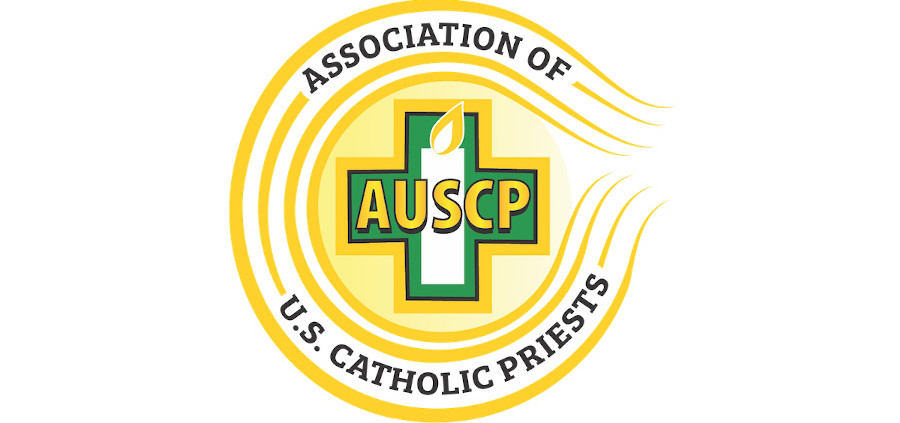A Report from the AUSCP Annual Assembly: Day 3
Mary J. Novak, Executive Director of NETWORK Lobby for Catholic Social Justice, began the third day of the Association of US Catholic Priests (AUSCP) annual assembly in Linthicum, Maryland, with her keynote address, “Decenter and Transcend: A Priesthood for the Healing of Our Church and World.”
Novak focused on how priests can contribute to the work of peacebuilding, which she described as “the church’s vocation” and something it “must do.”
Peacebuilding is an “umbrella term” that includes many fields of activity, she said. It “supports the development of relationships” at all levels of society.
Novak stressed that peacebuilding “is needed here” in the U.S. Drawing on the work of Rachel Kleinfeld and Jennifer McCoy of the Carnegie Endowment for International Peace, she said that a “pernicious polarization” in the U.S. has increased chances of political instability and civil war.
As a “cross-cutting institution” that exists across racial, economic, geographic, and political lines, the church is a place where peacebuilding can happen, she said. She cited the synodal process of “hearing from the whole people of God” as a model for peacebuilding “individually and institutionally.”
Novak shared the story of a group of Maryknoll Sisters who assisted with peacebuilding efforts in Kenya after the country’s violent 2007–2008 election. The sisters used a synodal process of “meetings as prayer” to facilitate encounter between participants of warring tribes and faiths. Participants were “rebuilding houses together” by the end of the process.
She also shared how a restorative justice program in the Archdiocese of Saint Paul and Minneapolis has initiated dialogue between victims of sexual abuse and church officials. The program has exposed church officials to the “trauma” of abuse and allowed victims to seek “hope amidst suffering.”
Restorative justice “puts the victim at the center,” she said. “Parishes were transformed” across the archdiocese because they “named the conflict” and “entered into the conflict.”
“In the midst of these stories, grace happens,” she said.
Cardinal Peter Turkson delivered the afternoon keynote, “Renewing the Spirit of Vatican II Is Essential to Our Path to the Future.” Cardinal Turkson is Chancellor of the Vatican Pontifical Academy of Sciences and the Pontifical Academy of Social Sciences.
Vatican II was meant to witness “to truth, unity, and charity in the church,” the cardinal said, describing it as “a council of renovation.” It is also “a principle of hermeneutics” for interpreting social problems.
Pope John XXIII “wanted the world outside to see into the church” when he convened the council in 1962. His resolution was born of the “ascertainment of the ills of society,” the cardinal explained.
The cardinal emphasized the pastoral spirit of the council that “consists in studying and deepening [church] doctrine and expressing it in a way in which it can be better understood, accepted and loved.” The council was “a moment to prefer the medicine of mercy” and “a process of renewal rooted in the Word of God.”
Using the image of blending old and new wine, the cardinal said that change “does not limit or diminish” the church’s identity. He quoted Cardinal John Henry Newman: “To live is to change, and to be perfect is to have changed often.”
Cardinal Turkson traced the influence of the council on Pope Francis’s thought and practice, particularly his contributions to the 2007 Latin American Episcopal Conference in Aparecida, Brazil. He described Francis’s “three areas of change”: changing reality “as a co-creator”; changing oneself “in a conversion experience”; and changing others “by serving change” or offering help.
“Humanity has a mandate to change,” he said.
He concluded by outlining a “path to a better future” that is “the path of the fraternity of all people.” This fraternity is “one of the signs of the times” that Vatican II brought to light, he said.
“The origin of violence in the world was a rejection of fraternity,” he added.
After the cardinal’s presentation, attendees convened for a Mass celebrated by Cardinal Wilton Gregory of the Archdiocese of Washington. The Mass was a vigil for the Solemnity of the Nativity of Saint John the Baptist. Music was provided by members of St. Joseph Catholic Church in Odenton, Maryland.
In his homily, Cardinal Gregory spoke of John the Baptist as “a symbol of hope and of anticipation of the plan of God,” adding, “hope is the virtue that the church needs most today.”
The day concluded with the presentation of the John XXIII Awards. The award is given annually by the AUSCP to those who embody the spirit and vision of the Second Vatican Council. This year’s recipients were Jeannine Gramick, SL, co-founder of New Ways Ministry; Cathy McClain, a mother and grandmother who worked to establish the Safe Streets program to reduce violent crime in Baltimore’s Cherry Hill neighborhood; and Fr. Joseph Muth, a Baltimore pastor whose parish created the Immigration Outreach Service Center to provide necessary services to immigrants.
“Take time to pray and work,” Fr. Muth said in his brief acceptance speech. “You never know how it’s going to unfold.” ♦
Our coverage of the AUSCP assembly will continue throughout the week. Coverage of Day 1 is available here; Day 2 is here.





Leave a Reply
Want to join the discussion?Feel free to contribute!